Soccer Boss
Copyright : Alternative Software | Reviewed by : Ritchardo
Originally released as ‘The BossÂ' by Peaksoft and re-issued as ‘Soccer BossÂ' by Alternative Software, this is a text only football management game that sees you trying to lead your team from fourth division obscurity to the higher echelons of the first division and FA Cup glory.
Based loosely on the old English leagues, ‘The BossÂ' consists of four leagues of 20 teams and as this was written during the late 80s European ban era, features only domestic competitions.
If youÂ're not a fan of the English game, the option is available to edit team names and customise the leagues to your taste. You can also change the names of the players in your team at the beginning of the game, however, there is no option to change those that you find later in the transfer market making this particular option fairly redundant.
Managing your team is fairly simple and takes the form of buying players, keeping an eye on your finances and picking the team. And thatÂ's pretty much it to be honest! As you would expect for a game of this type over twenty years old, thereÂ's little in the way of tactical depth, team decisions basically boiling down to being given a summary of the strengths of the opposition and tinkering with your team to try and be better than them in the key areas.
Player abilities are reflected only in their current form ranging from 0-9 and fluctuating individually on a game by game basis. You are given no indication of whether or not someone has had a good game other than whether or not his form dips or rises and even this is not totally reflective of the match that youÂ've just had. IÂ've witnessed games in the past where a player has scored a hat-trick and still had his form drop after the match.
If your team is starting to look a bit jaded you can inject some new quality by dipping into the transfer market. Players are denoted by their form and the higher the form, the higher their price. Negotiation is not possible, instead itÂ's a straight forward system that charges you a price per ÂŁ100,000 depending on their current form. For example a player with a value of 8 will cost ÂŁ800,000 while a player with a form of 0 will be free.
As your pool only has space for four additional players outside of the starting 11, youÂ'll probably have to sell a few players on if you want to keep improving the squad. Selling is also simplistic and works in a similar vein, players fetching ÂŁ25,000 less than they would currently be worth on the market.
Other than the match screen itself, the most important screen in the game is the league table and news ticker that appear after each round of fixtures. This shows your position in the league and updates you with all of the relevant club news for the week including injuries, suspensions, income, expenditure and transfers. If your finances slide into the red, you will be unable to continue with the game until you have sold enough players off to return to the black. Naturally you could envisage this situation occuring at somewhere like Manchester United with Sir Alex Ferguson being told he has to sell off Wayne Rooney and Christiano Ronaldo before playing Bournemouth in the FA Cup!
You will occasionally be told that one of your players has been sold. Again, you have no control over this and are instead told how much he fetched. Sometimes itÂ's to your advantage with a player of little value going for a song, other times youÂ're left with a deficit. This is both annoying and frustrating, ruining your perfectly planned finances in one fell swoop. On the postive side, assuming you have space in your squad, you will occassionaly sign a trialist who can range in quality from 0-9. You can either retain or sell him on and keep the profits. Bargain!
One word of warning, do not over stock your team. If you have a player out injured and you buy in another player without making space for the returning injured player, he will be lost in the mists of time!
The match itself is a simple afair taking the form of a countdown, the clock ticking along until it reaches 90 minutes. The clock stops and the border begins to flash everytime a goal is scored, a sound effect of anticipation building until either you conceed or score the goal. One note, however, there are never more than seven goals with the maximum any team scoring being four. Therefore if you go four up you know that youÂ're home and dry!
The presentation is very basic and there are a few errors that can break the programme completely – very frustrating when youÂ're on a long run of games without saving. For example, selecting a number out of the given range (easy to do when all figures have to be entered 01, 02 etc) will prompt the error message “Subscript out of range in 60” and quit you back to BASIC. Really poor stuff.
Overall, ‘The BossÂ' is an entertaining diversion for people who donÂ't want to get too absorbed in facts and figures when playing their football management games. The lack of any real graphics is a disappointment and the whole package is just a little too BASIC for its own good. Another disappointing factor is the randomness of the whole thing – you can load your team with great players and be a stronger team all round, but still get cuffed 4-0 from the team at the bottom of the league!
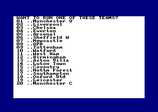
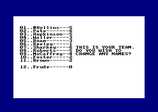
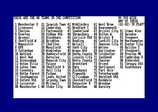
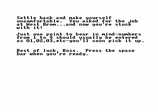
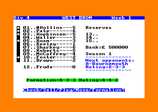
 Latest additions to the review archives
Latest additions to the review archives Thanks to everyone below for your contributions
Thanks to everyone below for your contributions Bookmark
Bookmark








